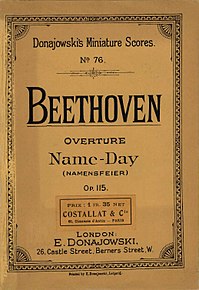Ernst Eulenburg (music publisher)
| Ernst Eulenburg
|
|
|---|---|
| legal form | & Co. GmbH and Ltd. |
| founding | 1874 |
| Seat | Mainz and London |
| management | Peter Hanser-Strecker , managing partner |
| Branch | Music industry |
| Website | www.eulenburg.de |
The music publisher Ernst Eulenburg was founded on February 1, 1874 by the German music publisher Ernst Eulenburg (1847–1926) in Leipzig.
history
Initially, Ernst Eulenburg published teaching material and choral works . In 1892 he took over the series Payne's small score edition ( chamber music ) from AH Payne (Leipzig) and in 1894 Donajowski's Miniature Scores from E. Donajowski (London). This laid the foundation stone for the series of scores for orchestral and chamber music: The series Eulenburg's Small Score Edition , published since 1894 , became world-famous among students, musicians and music lovers. To this day it is published under the name Eulenburg Study Scores and is constantly being expanded.
In 1905 the publisher's newly graduated son, Kurt Eulenburg (1879–1982), joined the publishing house as a bookseller and in 1911 took over the management of the publishing house. He ensured a rapid expansion of the program. After his father's death in 1926, Kurt became the sole owner of the publishing house. In 1939 he founded the British subsidiary Ernst Eulenburg Ltd. in London. A short time later, the Leipzig publishing house was expropriated by the National Socialists on the basis of the ordinance on the use of Jewish assets of December 3, 1938. Kurt Eulenburg went into exile in Switzerland and from there on September 23, 1939 submitted an application to the Leipzig District Court for “deletion of the company”. However, the Leipziger Verlag was finally sold to the bookseller Horst Sander in 1940 and operated under the name Horst Sander KG until the end of the 1950s. Kurt Eulenburg and his family moved to London after the war. Branches were set up in Zurich (1947) and Stuttgart (1950). Only in 1954 did Eulenburg regain possession of his confiscated Leipzig catalog. In 1957 Schott Music Ltd. (London) taken over. Kurt Eulenburg remained responsible for the pocket score series until he left in 1968.
Publishing program
Edition Eulenburg's publishing program today represents the world's largest series of scores with over 1,200 titles. The repertoire includes orchestral and choral works as well as chamber music and musical theater from the baroque to the modern. Edition Eulenburg now publishes five series:
- Eulenburg study scores (ETP), pocket scores (since 1894)
- Eulenburg Audio + Score (EAS), study scores of the greatest masterpieces of orchestral literature with a CD recording (since 2006)
- Eulenburg Orchestral Series (EOS), performance material of orchestral works with and without a choir
- Eulenburg Chamber Series (ECS), performance material of individual parts of chamber music
- Praeclassica (PC), performance material from the pre- and early classical repertoire
Web links
- Website of Ernst Eulenburg published by Schott Music
Individual evidence
- ↑ The first edition of the Eulenburg study scores series contains: Wolfgang Amadeus Mozart: String Quartet in G major. KV 387, ISBN 978-3-7957-6836-2 , ISMN 979-0-2002-0025-6.
- ^ Hans-Hubert Schönzeler: Kurt Eulenburg at 100. Recollections of a Century in Music Publishing. Musical Times, 120, 1979, pp. 127-128.
- ^ German-Russian Center Saxony eV (ed.): Journal Jews in Saxony. ( Memento of January 19, 2016 in the Internet Archive ) Leipzig 2009, pp. 9–10, ISSN 1866-5853 (PDF file, 332 kB)
- ↑ Publishing history ( memento of August 3, 2012 in the web archive archive.today ) on eulenburg.de
- ^ Edition Eulenburg general catalog. (PDF file; 2.5 MB) In: schott-musik.de. Retrieved October 20, 2019 .


